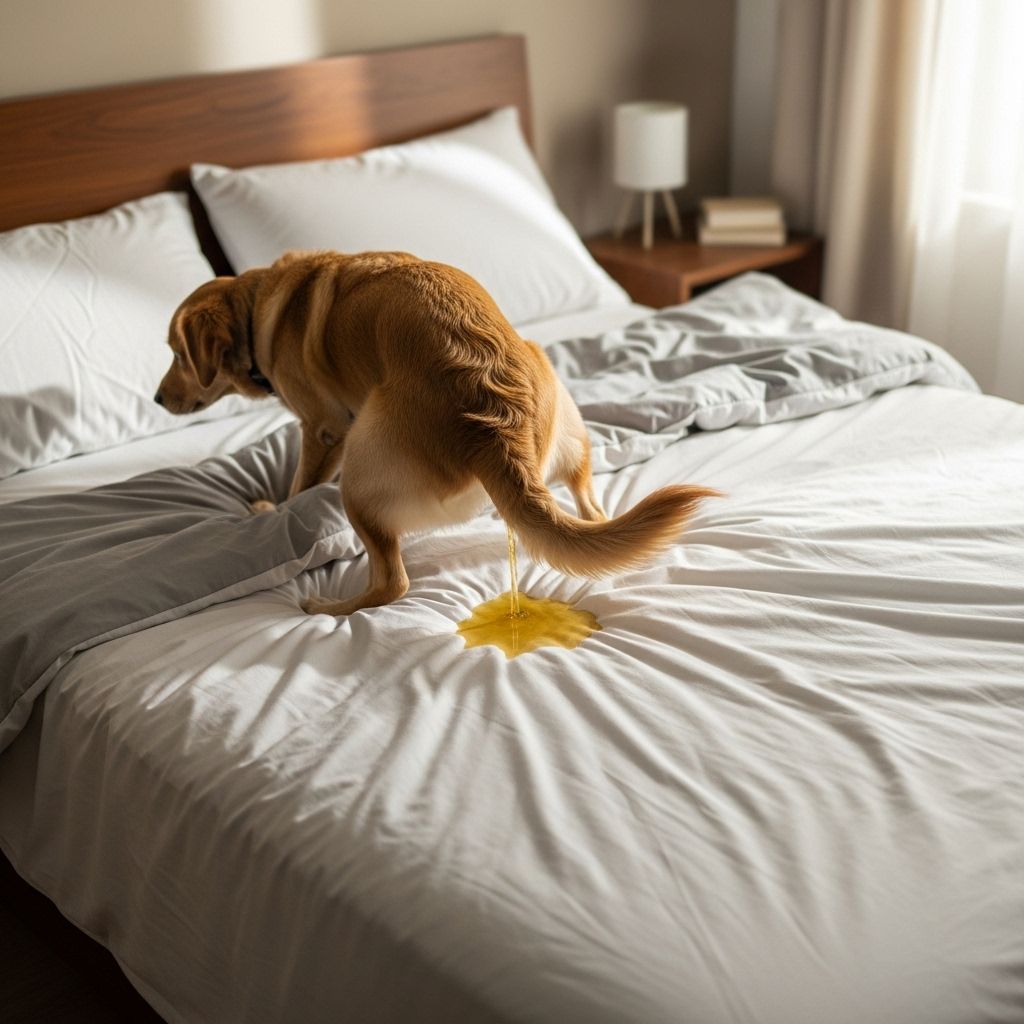Dog Peeing On Bed: 5 Common Causes And Easy Solutions
Understanding why your dog pees on the bed and how to stop this behavior safely and effectively.

Image: HearthJunction Design Team
Why Is My Dog Peeing on the Bed?
Finding that your dog has peed on the bed can be frustrating and puzzling. This behavior can stem from various causes, ranging from health issues to emotional distress or behavioral challenges. Understanding the root cause is key to effectively addressing and correcting the problem.
Medical Causes
If your dog is urinating on the bed during sleep or rest, it might signal a medical problem such as urinary incontinence, bladder infections, or other underlying health conditions. Incontinence is more common in older dogs or dogs with certain diseases that affect bladder control.
If you notice frequent or unexplained urination on the bed, it is important to consult a veterinarian to rule out medical complications.
Behavioral and Training Issues
Dogs that are not fully potty trained may urinate indoors, including on beds. Puppies and newly adopted dogs might not yet understand house rules or have regular bathroom routines. Additionally, even adult dogs who have not been consistently trained or have lapses in their routine may resort to indoor urination.
Checking whether your dog has been recently taken outside for bathroom breaks is essential in assessing if this is a training-related issue.
Emotional Distress and Anxiety
Dogs can express anxiety, stress, or other emotional problems by urinating in inappropriate places, such as their bed or your bed. Key emotional triggers include:
- Changes in daily routine
- Altered environment or new surroundings
- Loud noises or disruptions
- Travel and unfamiliar places
- Loss or departure of a family member or another pet
- Underlying depression or past trauma resurfacing
Recognizing signs of emotional distress in your dog can help you provide the necessary support and adjust their environment to reduce anxiety.
Difference Between Urine Marking and Peeing
It is important to distinguish between urine marking and typical peeing behaviors. Urine marking is a normal behavior in dogs, where they deposit small amounts of urine on vertical surfaces like walls, fences, or furniture to mark territory.
In contrast, peeing on the bed usually involves larger volumes of urine and is more indicative of health or behavioral problems rather than marking.
Common Reasons Dogs Pee on Their Beds
- Incontinence or Medical Conditions: Weak bladder control due to illness.
- Lack of Proper Potty Training: Puppies or untrained dogs may not understand bathroom rules.
- Stress and Anxiety: Emotional upset leading to accidents indoors.
- Marking Behavior: Although less likely on horizontal surfaces like beds, some dogs mark frequently in their sleeping areas.
- Territorial Behavior: Sometimes, a dog may pee on the bed to stake a claim, especially if multiple pets reside in the household.
How to Stop Your Dog from Peeing on the Bed
Once you identify the cause, you can employ strategies to prevent your dog from urinating on the bed again.
Consult Your Veterinarian
Rule out medical issues by having your dog examined by a vet. Treatment for infections, incontinence, or other health problems can resolve inappropriate urination.
Strengthen Potty Training
- Take your dog outside frequently—especially after meals, naps, and playtime.
- Reward successful outdoor elimination with treats and praise.
- Use a consistent bathroom schedule to build reliable habits.
- Supervise your dog indoors and interrupt accidents immediately.
- Consider crate training as dogs usually avoid soiling their sleeping area if the crate is appropriately sized.
Manage Emotional Triggers
- Provide a calm, stable environment and avoid sudden changes.
- Use calming aids such as pheromone diffusers or anxiety wraps if necessary.
- Ensure your dog has plenty of exercise and mental stimulation.
- Spend quality time with your dog to reinforce security and trust.
Restrict Access to the Bed Temporarily
Limit your dog’s access to the bedroom or the bed until the behavior is corrected. This prevents reinforcement of the habit and allows training to be more effective.
Cleaning Up After Your Dog Pees on the Bed
Proper cleaning is essential to remove odors that may attract your dog to urinate on the bed again.
- Use Enzymatic Cleaners: These break down urine molecules, eliminating odors completely.
- Wash Bedding Promptly: Remove and launder all bedding materials as soon as possible.
- Follow Manufacturer Instructions: Check washing labels to avoid damaging bedding.
- Ensure Thorough Drying: A damp bed can develop mold and mildew, which is harmful to both pets and humans.
Frequently Asked Questions (FAQs)
Q: Can stress cause a dog to pee on the bed?
A: Yes, emotional distress such as anxiety or changes in the environment can cause a dog to urinate on their bed as a coping behavior.
Q: Is urine marking the same as peeing on the bed?
A: No, urine marking involves small amounts of urine on vertical surfaces mainly for territorial purposes, while peeing on the bed typically involves larger amounts and indicates other issues.
Q: How can I tell if my dog has a medical issue causing bed wetting?
A: Frequent or nighttime urination accidents, changes in behavior, or signs of discomfort suggest a medical problem, and you should consult your veterinarian promptly.
Q: Can crate training help stop bed wetting?
A: Yes, properly sized crates discourage dogs from urinating in their sleep area and can be a helpful part of potty training.
Q: What cleaning products are safe to use on dog beds?
A: Enzymatic cleaners designed for pet urine are safe and effective for eliminating odors and stains without harming your dog’s skin.
References
- https://www.akc.org/expert-advice/home-living/how-to-clean-a-dog-bed/
- https://www.akc.org/expert-advice/training/marking-vs-peeing/
- https://www.americanpoweresc.com/?a=226957213
- https://www.akc.org/expert-advice/training/dog-pees-in-crate/
- https://petparentsbrand.com/blogs/pet-parenting/why-does-my-dog-pee-on-his-bed
Read full bio of Shinta












